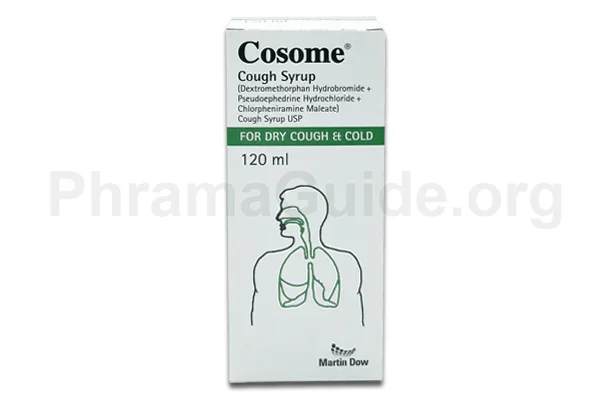Cosome syrup is a combination medicine that is primarily used to Relieve Cough, Treat Allergies, Relieve Congestion, and other respiratory problems. The following are some common uses and indications of Cosome Syrup:
- Cough: Cosome syrup is used as a cough suppressant, that helps to alleviate persistent or irritating coughing.
- Nasal Congestion: Cosome syrup also used as a decongestant, helps to reduce nasal congestion by constricting blood vessels in the nasal passages, allowing for easier breathing.
- Common Cold: Cosome syrup is commonly used to relieve symptoms of a runny or stuffy nose that are often associated with colds and allergies.
- Sneezing: The use of Cosome syrup can help reduce sneezing caused by allergens.
- Watery Eyes: Cosome syrup is also used to relieve watery and itchy eyes that may occur due to allergies.
- Itchy or Watery Throat: Dextromethorphan and chlorpheniramine may provide relief from throat irritation or discomfort.
Off-label Uses of Cosome Syrup
- Sinusitis: Cosome syrup’s decongestant properties may help relieve nasal congestion associated with sinusitis. However, the primary treatment for sinusitis usually involves antibiotics and other specific interventions.
- Bronchitis: Cosome syrup’s cough-suppressing effects might be used to manage coughing associated with acute bronchitis. However, the underlying cause and severity of bronchitis should be evaluated by a healthcare provider.

What is Cosome?
Cosome Syrup is a combination of Dextromethorphan, Pseudoephedrine, and Chlorpheniramine, manufactured and marketed by Martindow Marker (Pvt) Ltd, Pakistan.
Cosome Alternatives : Other Similar Brands
The following are Some Alternative Brands of Cosome Syrup and Their Manufacturers.
Combinol DM : Atco Laboratories Ltd, Pakistan.
Pacific’s DM : Pacific Pharmaceuticals Ltd, Pakistan.
Conil : Bloom Pharmaceuticals (Pvt) Ltd, Pakistan.
Epinol DM : (CCL) Consolidated Chemical Laboratories (Pvt) Ltd, Pakistan.
Reltus DM : Pharmatec Pakistan (Pvt) Ltd, Pakistan.
Denol DM : Nova Med Pharmaceuticals, Pakistan.
Trimanic Flu & Cough : Novartis Pharma (Pakistan) Ltd.
Cofcold DM : Life Pharmaceutical Company, Pakistan.
Kofnil D : The Schazoo Laboratories Ltd, Pakistan.
Pulmax : Sharooq Pharmaceuticals, Pakistan.
Cosome : Available Formulations and Strengths
Presently, Cosome is available in Syrup form with the following Generic and Brand names.
Cosome Syrup Decongestant/Non-Productive Cough Syrup
Each 5ml Contains:
- Dextromethorphan: 10mg
- Pseudoephedrine (Maleate): 2mg
- Chlorpheniramine (HCl): 30mg
Cosome-E Syrup Bronchodilator/Cough Syrup
Each 5ml Contains:
- Ammonium Hydrochloride: 30mg
- Diphenhydramine HCl: 8mg
- Aminophylline: 32mg
- Menthol: 0.98mg
Who Should Not Use Cosome?
Cosome syrup may have contraindications, which are specific situations or conditions where the use of this syrup is not recommended or should be avoided due to potential risks.
- Hypersensitivity: If you have a known hypersensitivity or allergy to dextromethorphan, pseudoephedrine, chlorpheniramine, or any other ingredients in the syrup, you should not use Cosome syrup.
- Monoamine Oxidase Inhibitors (MAOIs): Cosome syrup may have interactions with MAOIs, which are a type of antidepressant. Concurrent use can lead to serious and potentially life-threatening reactions, such as serotonin syndrome. MAOIs should be discontinued for a sufficient duration before using Cosome syrup, and a healthcare provider’s guidance is essential.
- Severe High Blood Pressure (Hypertension): Cosome has a decongestant that can increase blood pressure. If you have severe hypertension, using this syrup could further elevate your blood pressure and may not be safe.
- Coronary Artery Disease: Pseudoephedrine can also affect the heart and blood vessels. If you have coronary artery disease or other cardiovascular conditions, Cosome syrup should be used with caution and under a healthcare provider’s supervision.
- Certain Heart Conditions: Individuals with arrhythmias, tachycardia, or other heart rhythm disturbances should avoid using Cosome syrup due to the potential cardiovascular effects of pseudoephedrine and chlorpheniramine.
- Glaucoma: Pseudoephedrine can increase intraocular pressure and worsen glaucoma. If you have glaucoma, using Cosome syrup may not be recommended.
- Enlarged Prostate (Benign Prostatic Hyperplasia): Pseudoephedrine can exacerbate symptoms of an enlarged prostate, including difficulty urinating.
- Certain Urinary Conditions: Individuals with urinary retention, bladder neck obstruction, or other urinary issues should use Cosome syrup with caution due to the potential effects of pseudoephedrine.
- Liver Disease: The metabolism of chlorpheniramine and dextromethorphan may be affected by liver dysfunction, potentially leading to increased levels of these drugs in the body. This could increase the risk of adverse effects.
- Respiratory Conditions: Individuals with chronic respiratory conditions, such as chronic obstructive pulmonary disease (COPD), asthma, or bronchitis, should use this combination with caution due to the potential respiratory effects of dextromethorphan.
- Thyroid Disorders: Pseudoephedrine can affect thyroid hormone levels, potentially worsening thyroid disorders.
Recommended Daily Dosage of Cosome Syrup
Cosome Syrup Dose for Children (2 to 6 years):
- 1 teaspoonful three times daily.
Cosome Syrup Dose for Children (6 to 12 years):
- 1 to 2 teaspoonfuls three times daily.
Cosome Syrup Dose for Adults:
- 2 teaspoonfuls three times daily.
How Cosome Works?
Cosome syrup is a combination of three active ingredients and each ingredient has a distinct mode of action:
- Dextromethorphan:
- Mode of Action: Dextromethorphan is a cough suppressant that works by acting on the cough center in the brain. It reduces the brain’s signals that trigger the urge to cough, providing temporary relief from coughing.
- Effect: Dextromethorphan helps to control persistent or irritating coughs.
- Pseudoephedrine:
- Mode of Action: Pseudoephedrine is a nasal decongestant that works by narrowing the blood vessels in the nasal passages. This reduces blood flow to the congested area and decreases swelling, making it easier to breathe.
- Effect: Pseudoephedrine helps relieve nasal congestion, allowing for improved airflow and reduced stuffiness.
- Chlorpheniramine:
- Mode of Action: Chlorpheniramine is an antihistamine that blocks the effects of histamine, a substance released during allergic reactions. Histamine is responsible for symptoms like runny nose, sneezing, and itchy eyes.
- Effect: Chlorpheniramine helps alleviate allergy-related symptoms, including runny nose, sneezing, and itchy or watery eyes.

Leave A Comment